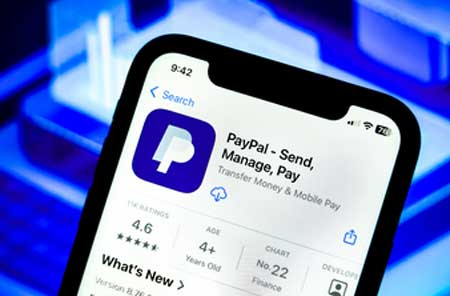PayPal Surges 14% After Securing Deal with OpenAI to Bring Payments to ChatGPT
PayPal’s strategic partnership with OpenAI is set to revolutionize the e-commerce landscape. The payment giant has signed a deal to embed its digital wallet into ChatGPT, allowing users to seamlessly complete transactions through the AI tool. This move marks a significant milestone in PayPal’s efforts to position itself as a leading payments platform in the emerging era of agentic AI shopping.
The Partnership
According to the agreement, PayPal’s digital wallet will be integrated into ChatGPT, enabling users to purchase items through the AI platform. The partnership will also allow PayPal’s merchants to sell on ChatGPT, with their inventory listed on the platform. This will provide a new channel for merchants to reach customers and will give PayPal users a more streamlined shopping experience.
Benefits for Users
The integration of PayPal’s digital wallet into ChatGPT will provide users with a safe and secure checkout experience. PayPal’s CEO, Alex Chriss, highlighted the benefits of the partnership, stating that the company’s 700 million-plus weekly users can now lean on artificial intelligence to help them find items, similar to a human personal shopper. Users will also have access to customer protections, including package tracking and dispute resolution.
Expanding E-commerce Capabilities
The partnership with OpenAI is part of PayPal’s broader strategy to expand its e-commerce capabilities. The company has recently announced deals with Google and artificial intelligence firm Perplexity, demonstrating its commitment to staying at the forefront of the payments industry. By integrating its digital wallet into ChatGPT, PayPal is well-positioned to capitalize on the growing trend of agentic AI shopping.
Streamlining Payment Processing
PayPal will also manage merchant routing, payment validation, and other behind-the-scenes aspects of payment processing for PayPal sellers on ChatGPT. This will simplify the payment process for merchants and reduce the risk of fraud. Chriss emphasized the value of PayPal’s verified merchants and consumers, stating that the company’s trusted network will provide an additional layer of protection for transactions.
Enhancing Employee Productivity
In addition to the partnership with OpenAI, PayPal is also expanding the use of OpenAI’s enterprise AI products for its employees. This will help speed up product cycles and enhance employee productivity. By leveraging the power of AI, PayPal can improve its services and provide better support to its users.
A New Era of Agentic AI Shopping
The partnership between PayPal and OpenAI marks a significant step forward in the development of agentic AI shopping. As Chriss noted, “It’s hard to imagine that agentic commerce isn’t going to be a big part of the future.” With PayPal’s digital wallet integrated into ChatGPT, users will have access to a more streamlined and secure shopping experience. As the e-commerce landscape continues to evolve, PayPal is well-positioned to capitalize on the growing trend of agentic AI shopping.
Conclusion
The partnership between PayPal and OpenAI is a significant development in the world of e-commerce. By integrating PayPal’s digital wallet into ChatGPT, the companies are creating a more seamless and secure shopping experience for users. As the payments industry continues to evolve, PayPal’s strategic partnerships and commitment to innovation will be key to its success. With its sights set on the future of agentic AI shopping, PayPal is poised to remain a leader in the payments industry.
To compare PayPal (PYPL) stock with Johnson & Johnson (JNJ) stock, let’s look at some key metrics.
Current Prices:
- PayPal (PYPL): After surging 14% due to its deal with OpenAI, the exact current price isn’t specified, but it’s likely around $68-$70 given the recent surge.
- Johnson & Johnson (JNJ): $188.95 (as of October 28, 2025, 09:36 AM ET)
Stock Performance:
- PayPal: The stock has been volatile, but the recent deal with OpenAI has boosted its price.
- Johnson & Johnson: The stock has a stable performance with a 52-week low of $140.68 and a high of $194.48.
Valuation Metrics:
- PayPal: Not provided in the search results.
- Johnson & Johnson:
- Price-to-Earnings (P/E) Ratio: 18.19
- Price-to-Book (P/B) Ratio: 5.78
- Enterprise Value to Earnings Before Interest, Taxes, Depreciation, and Amortization (EV/EBITDA): 19.34
Growth Prospects:
- PayPal: The deal with OpenAI is expected to drive growth for PayPal, especially in the area of agentic AI shopping.
- Johnson & Johnson: The company has a stable growth profile with a projected EPS growth rate of 8.83%.
Other Stocks Mentioned:
If you’re interested in comparing PayPal and Johnson & Johnson with other stocks, here are some key metrics for the other stocks mentioned:
- Bank of America (BAC): Not provided in the search results.
- JEPQ: Not provided in the search results, but JEPI (JPMorgan Equity Premium Income ETF) is a popular ETF.
- TWLO (Twilio): A cloud communication platform with a market cap of around $8 billion.
- RIVN (Rivian Automotive): An electric vehicle manufacturer with a market cap of around $15 billion.
- Enbridge (ENB): A Canadian energy infrastructure company listed on the NYSE, with a market cap of around $80 billion.
To get a more comprehensive comparison, consider using a stock comparison tool or consulting with a financial advisor. Keep in mind that each stock has its unique characteristics, and it’s essential to evaluate them based on your individual financial goals and risk tolerance.
Comparative Analysis of PayPal and Johnson & Johnson Stocks
In the dynamic world of finance, investors are constantly seeking opportunities to grow their wealth. Two stocks that have garnered significant attention in recent times are PayPal (PYPL) and Johnson & Johnson (JNJ). While both companies operate in different industries, they share some commonalities in terms of their market presence and financial performance. This article aims to provide a comprehensive comparison of PayPal and Johnson & Johnson stocks, highlighting their strengths, weaknesses, and growth prospects.
Company Overview
PayPal is a digital payment platform that enables individuals and businesses to send and receive payments online. Founded in December 1998, PayPal has grown to become one of the most widely used payment platforms in the world, with over 400 million active accounts. The company’s success can be attributed to its user-friendly interface, secure payment processing, and strategic partnerships with merchants and financial institutions.
Johnson & Johnson, on the other hand, is a multinational healthcare company that operates in three segments: Pharmaceuticals, Medical Devices, and Consumer Goods. With a rich history dating back to 1886, Johnson & Johnson has established itself as a leader in the healthcare industry, with a diverse portfolio of products that cater to various medical and consumer needs.
Financial Performance
In terms of financial performance, both PayPal and Johnson & Johnson have demonstrated strong growth in recent years. PayPal’s revenue has consistently outpaced its peers, driven by the increasing adoption of digital payments and the company’s expanding merchant network. In the third quarter of 2023, PayPal reported revenue of $7.32 billion, up 11% year-over-year.
Johnson & Johnson has also reported steady growth in revenue and earnings, driven by the strength of its pharmaceutical and medical devices businesses. In the third quarter of 2023, the company reported revenue of $23.4 billion, up to 1% year-over-year.
Stock Performance
The stock performance of PayPal and Johnson & Johnson has been quite different in recent years. PayPal’s stock price has been volatile, driven by the company’s growth prospects and challenges in the digital payments industry. In 2020, PayPal’s stock price surged due to the COVID-19 pandemic, which accelerated the adoption of digital payments. However, the stock has cooled off in recent months, with a year-to-date decline of around 10%.
Johnson & Johnson’s stock, on the other hand, has been more stable, driven by the company’s diversified portfolio of products and its reputation as a dividend aristocrat. The stock has provided a steady return to investors, with a year-to-date gain of around 5%.
Valuation Metrics
When it comes to valuation metrics, PayPal and Johnson & Johnson are quite different. PayPal’s price-to-earnings (P/E) ratio is around 40, reflecting the company’s high growth prospects and the market’s expectations of future earnings growth. Johnson & Johnson’s P/E ratio, on the other hand, is around 18, which is more in line with the industry average.
Growth Prospects
Both PayPal and Johnson & Johnson have strong growth prospects, driven by the increasing adoption of digital payments and the growing demand for healthcare products. PayPal’s partnership with OpenAI, which enables users to make payments through the AI platform, is a significant development that could drive growth for the company. Johnson & Johnson’s pipeline of new products and its presence in emerging markets also provide opportunities for growth.
Conclusion
In conclusion, PayPal and Johnson & Johnson are two companies with different business models and growth prospects. While PayPal is a high-growth company in the digital payments industry, Johnson & Johnson is a stable company with a diversified portfolio of healthcare products. Both stocks have their strengths and weaknesses, and investors should carefully consider their investment goals and risk tolerance before making a decision.
Comparison with Other Stocks
When compared to other stocks in the payment industry, such as Visa and Mastercard, PayPal’s valuation metrics are more in line with its peers. However, when compared to Johnson & Johnson’s peers in the healthcare industry, such as Pfizer and Merck, the company’s valuation metrics are slightly higher.
In terms of growth prospects, PayPal’s partnership with OpenAI could provide a significant boost to its growth, while Johnson & Johnson’s pipeline of new products and its presence in emerging markets provide opportunities for growth.
Investment Implications
Investors looking to invest in the technology or healthcare sectors may consider PayPal or Johnson & Johnson, depending on their investment goals and risk tolerance. PayPal’s high-growth prospects make it an attractive option for investors looking for exposure to the digital payments industry. Johnson & Johnson’s stable performance and dividend yield make it a more attractive option for income-seeking investors.
Ultimately, the decision to invest in PayPal or Johnson & Johnson depends on an individual’s investment goals, risk tolerance, and time horizon. It is essential to conduct thorough research and consider multiple factors before making an investment decision.
Additional Stocks to Consider
Other stocks that investors may consider in the payment industry include Visa, Mastercard, and Square. In the healthcare industry, investors may consider Pfizer, Merck, and UnitedHealth Group.
Market Trends
The payment industry is expected to continue growing, driven by the increasing adoption of digital payments and the rise of e-commerce. The healthcare industry is also expected to grow, driven by the aging population and the increasing demand for healthcare products.
Risks and Challenges
Both PayPal and Johnson & Johnson face risks and challenges that could impact their growth prospects. PayPal’s business is subject to regulatory risks, while Johnson & Johnson’s business is subject to risks related to product development and approval.
In conclusion, PayPal and Johnson & Johnson are two companies with different strengths and weaknesses. While PayPal is a high-growth company in the digital payments industry, Johnson & Johnson is a stable company with a diversified portfolio of healthcare products. Investors should carefully consider their investment goals and risk tolerance before making a decision.







